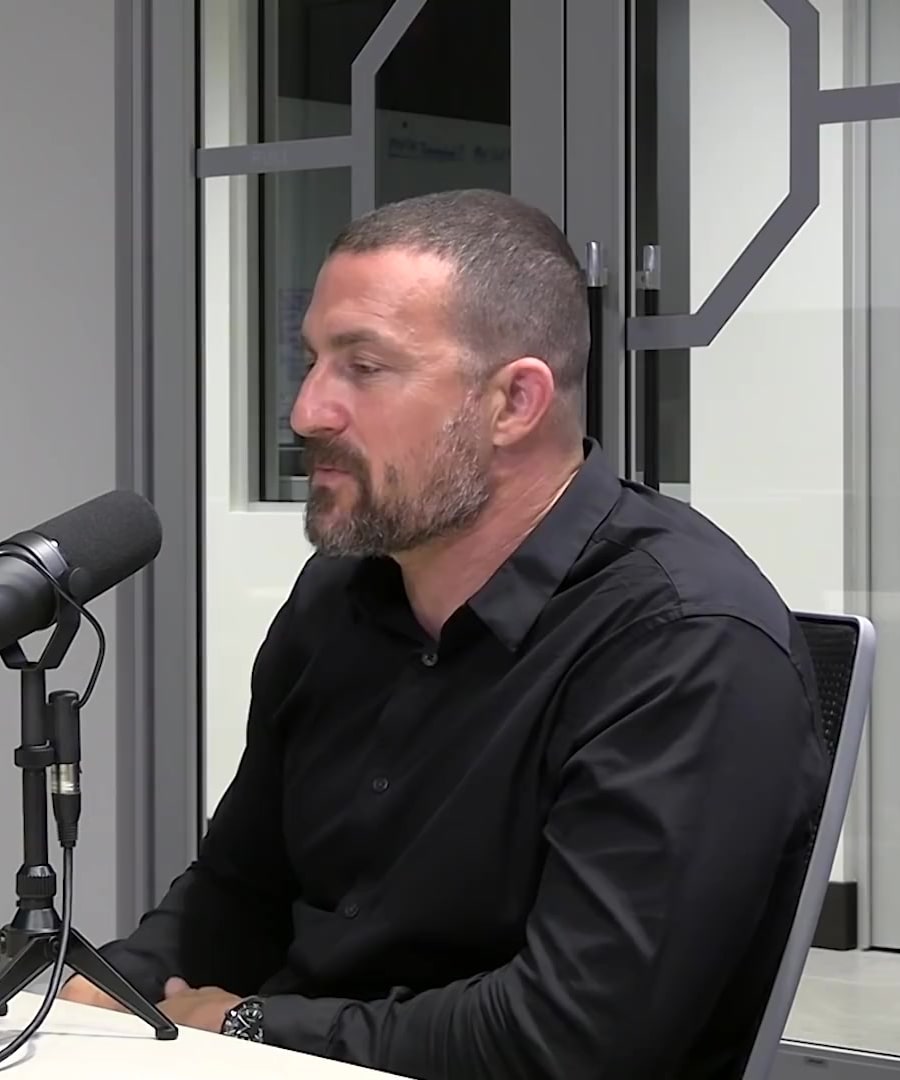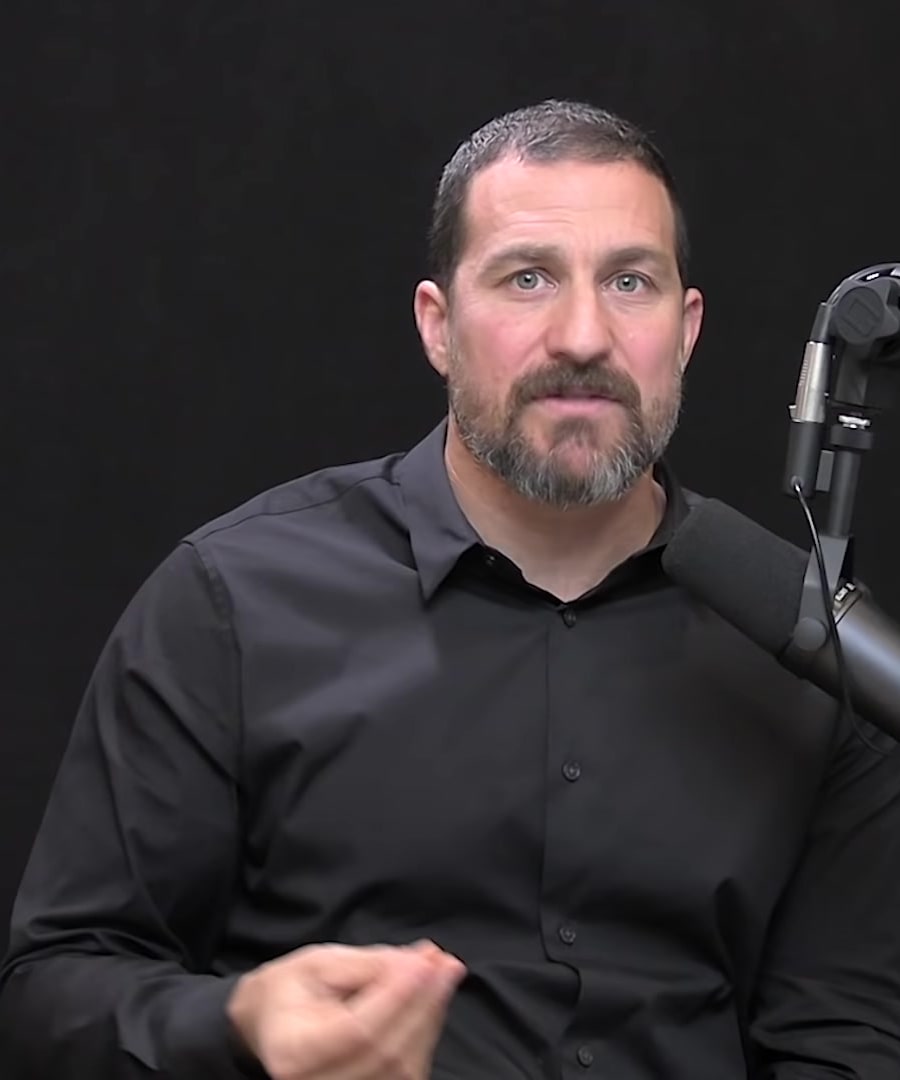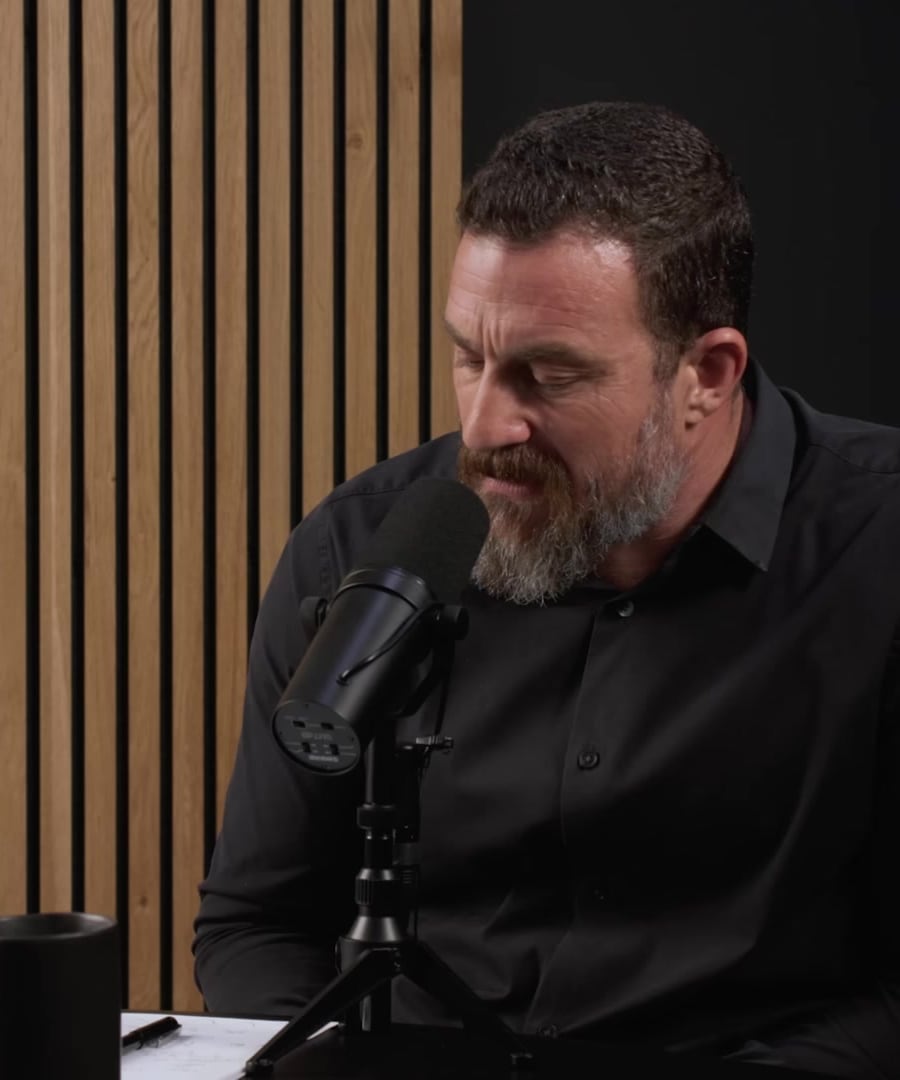Best protocols for combatting chronic fatigue
There are currently no specific clips from the Huberman Lab discussing protocols for combating chronic fatigue. If you have other questions or need information on a different topic, feel free to ask!
RELATED QUESTIONSWhat are some related questions about managing chronic fatigue?
Sources:
Here are some related questions about managing chronic fatigue based on the information provided by the Huberman Lab:
-
How does sleep impact chronic fatigue?
- Quality sleep is fundamental for regulating the autonomic nervous system and improving overall mental and physical health. Poor sleep can lead to dysregulation, which might manifest as chronic activation of alertness or chronic fatigue. Regular, sufficient sleep helps maintain a proper balance in the sympathetic and parasympathetic nervous systems, crucial for managing chronic fatigue 1.
-
Should I be concerned about dependence on supplements for energy?
- Dependence on supplements, especially those used for boosting energy or wakefulness, is a concern. It's important to manage fatigue by aiming for a physiological state that requires minimal supplementation. This involves optimizing lifestyle factors like diet, physical activity, and stress management. Taking occasional breaks from supplements ('supplement holidays') is also recommended to avoid dependency 2.
-
Are naps beneficial for managing chronic fatigue?
- Naps can be beneficial for some people experiencing chronic fatigue, especially if they naturally feel a dip in energy in the afternoon. However, the response to naps can vary widely; some may feel refreshed, while others could feel groggy, likely due to poor nighttime sleep. This highlights the importance of addressing the underlying sleep issues 3.
These questions reflect the insights provided by Dr. Huberman on managing contributing factors to chronic fatigue like sleep, supplement use, and daily energy levels.
RELATED QUESTIONS-
How can I improve my mental toughness
Sources:
Improving mental toughness can be effectively addressed through deliberate cold exposure, as discussed by . Here are key ways to enhance your mental toughness:
-
Cold Exposure Protocols:
- Deliberate exposure to cold, such as ice baths or cold showers, can significantly boost mental toughness. By facing and overcoming the discomfort of cold, one builds resilience. The process involves facing 'mental walls'—points where you feel an intense urge to quit. Each time you push past these walls, you strengthen your mental resilience. The important aspect is to gradually increase the challenge, ensuring it remains safe and manageable 1.
-
Controlled Cognitive Challenges:
- During cold exposure, try engaging in cognitive tasks to maintain mental clarity under stress. This trains your brain to function effectively during high-stress situations, improving your overall resilience. Simple mental exercises, such as recalling detailed information or solving complex problems while in the cold, can enhance your ability to stay clear-headed during stress 2.
-
Behavioral Flexibility:
- The ability to adjust your response during cold exposure is crucial. For instance, adjusting your breathing or mentally calming yourself can help manage the discomfort. This flexibility in handling stress translates well to real-life situations, where stress often arrives unexpectedly 3.
For more detailed protocols and information on enhancing mental toughness through cold exposure, you can refer to specific guidelines and recommendations provided in the Huberman Lab Neural Network Newsletter available at Huberman Lab's website 4.
RELATED QUESTIONS-
What did Matt walker say in a recent episode about writing down thoughts first thing in the morning?
Sources:
emphasizes the creative benefits of reflecting on your thoughts and experiences from sleep first thing in the morning. He suggests that instead of immediately engaging with the world, take some time for reflection. This might involve thinking about the day ahead, or the days prior, without specifically trying to recall your dreams. This practice can foster creativity and improve mental wellness 1.
RELATED QUESTIONSHow can I implement the practice of writing down thoughts in the morning?
Sources:
Implementing the practice of writing down your thoughts each morning can be enhanced by using specific techniques to foster creativity and clarify thinking. Here are some steps to incorporate this practice effectively:
-
Set a Regular Time: Dedicate a specific time each morning for this activity, ideally soon after you wake up. This routine will help establish it as a habit.
-
Comfortable Space: Choose a comfortable and quiet place where you can sit undisturbed. This can be anywhere that feels conducive to reflective thinking.
-
Choose Your Medium: Decide whether you prefer to write on paper or use a digital tool. Some people find the act of writing on paper to be more cathartic and tangible.
-
Start With Stillness: notes the benefits of starting with a state of stillness to activate the mind while the body is at rest, a condition favorable for creative thinking. You could begin by sitting quietly and letting your thoughts flow without directing them too strenuously. This mimics the creative processes observed in successful individuals like Rick Rubin and Carl Dyseroth, who use deliberate stillness to encourage mental activity 1.
-
Reflect Freely, Then Write: After a few moments of stillness, start writing whatever comes to your mind. This could be reflections on your dreams, thoughts about the upcoming day, or anything else. The key is not to force the thinking but to let it flow naturally.
-
Regular Review: Occasionally, go back and read what you’ve written in past days. This can provide insights into your thought patterns and emotional states over time, helping to refine future reflections.
These steps can not only help you start your day with a clear and creative mindset but also potentially enhance your overall mental well-being.
RELATED QUESTIONS-
If I don’t really sleep one night, what does Matt walker suggest I should do the next day to make up for a lost night’s sleep?
Sources:
After experiencing a night of poor sleep, Dr. Matthew Walker advises against trying to compensate the following day with extra sleep or napping. Instead, he strongly recommends maintaining your regular waking time and avoiding activities that might disrupt sleep continuity the following night. Specifically, you should:
- Avoid Napping: Napping can reduce sleep pressure, the build-up of sleep need, and thus can make it harder to fall asleep at your usual time the following night.
- Keep Regular Wake Times: Even after a poor night's sleep, it's important to wake up at your usual time to keep your internal clock (circadian rhythm) consistent.
- Don't Go to Bed Early: Resist the urge to go to bed earlier than normal; this can lead to lying awake in bed and can disrupt your sleep schedule.
- Avoid Extra Caffeine: Don’t increase your caffeine intake to counteract tiredness. This can keep you awake later in the day, further disrupting your sleep pattern 1.
In summary, the best approach is to continue your normal sleep routines and resist the natural impulses to adjust waking and sleeping times or to seek daytime sleep 1.
RELATED QUESTIONSWhat is cognitive fatigue?
Sources:
Cognitive fatigue refers to the state when there's a marked diminishment in cognitive abilities and performance due to prolonged mental activity. It often manifests as difficulty concentrating, diminished attention span, and overall reduced cognitive efficiency. This condition can make tasks that require continuous cognitive engagement, like complex problem-solving or decision-making, especially challenging.
The phenomena of cognitive fatigue may be influenced by various biological factors like depletion of neurotransmitters such as dopamine, which plays a key role in reward and pleasure, and neurotransmission regulation in cognitive tasks. Strategic breaks and proper nutrition can aid in mitigating cognitive fatigue, especially after intense cognitive or physical activities 1.
RELATED QUESTIONSIs there any recent research on cognitive fatigue?
Sources:
Recent research discussed on the Huberman Lab Podcast highlights the benefits of moderate exercise in managing and improving cognitive performance. A study referenced by found that 15 minutes of moderate exercise prior to engaging in cognitive tasks significantly enhanced performance in these tasks, particularly those requiring visual attention and focus. The exercise seemed to increase subjective feelings of energy, which played a crucial role in the improved cognitive performance observed. This suggests that regular physical activity could be a practical approach to combat cognitive fatigue and improve mental focus 1.
RELATED QUESTIONSAre there other recent studies on cognitive fatigue?
Sources:
In addition to the previously mentioned study on the effects of exercise on cognitive fatigue, Dr. Andrew Huberman also discussed other approaches:
-
Enhancing Learning and Memory: The spacing effect, which proposes adding short, ten-second rest periods during learning sessions, can increase the effectiveness of cognitive efforts by 20 times. This technique enhances learning by leveraging the brain's natural processes, which are maximized during these brief rest intervals 1.
-
Impact of Creatine on Cognitive Fatigue: A pilot study investigated the benefits of high-dose creatine on cognitive functions in patients with traumatic brain injuries (TBI). The findings indicated that creatine significantly reduced the frequency of headaches, dizziness, and fatigue, suggesting its potential to mitigate cognitive fatigue associated with TBI 2.
These pieces of research offer different strategies that directly or indirectly address cognitive fatigue through physical and nutritional interventions.
RELATED QUESTIONS-
In relation to the above Creatine study, how much should i take to combat cognitive fstigue?
Sources:
To combat cognitive fatigue, especially in the context of traumatic brain injuries (TBI), the recommended dosage of creatine is considerably higher than the amounts typically used for sports performance. In a pilot study discussed by Dr. Andrew Huberman, participants used a dose equivalent to 0.4 grams of creatine monohydrate per kilogram of body weight per day. For example, someone weighing 100 kg (approximately 220 lbs) would take 40 grams of creatine per day. This regimen was followed for a period of six months, leading to significant improvements in symptoms like headaches, dizziness, and fatigue 1.
Always consult with a healthcare professional before starting any new supplement regimen, particularly at high dosages, to ensure safety and appropriateness for your specific health condition.
RELATED QUESTIONSTell me more about the creatine study for cognitive fatigue.
Sources:
The creatine study discussed by focused on addressing cognitive fatigue and other symptoms in individuals suffering from traumatic brain injuries (TBI). Here are the significant details:
-
Study Design: It was a pilot study involving human participants. The primary goal was to test the hypothesis based on preclinical data from animal models that increasing creatine stores in the brain could improve cognitive function 1.
-
Dosage: The participants consumed creatine monohydrate at a dosage of 0.4 grams per kilogram of body weight daily. For someone weighing about 100 kg, this would be 40 grams per day. This dosage is higher than the usual 5-10 grams per day used for enhancing sports performance 1.
-
Duration: The creatine supplementation lasted for six months. The study monitored the accumulation of creatine stores in the participants' muscles and brain tissue over this period 1.
-
Findings: The most significant findings included a remarkable decrease in headache frequency among those taking creatine compared to the control group. The study also recorded quantifiable reductions in dizziness and both acute and chronic fatigue among the participants. These results were described as very striking, suggesting creatine's potential utility in mitigating TBI symptoms 1.
This pilot study, while limited in scale, provides promising data on the therapeutic benefits of high-dose creatine supplementation in reducing the cognitive and physical symptoms of TBI.
RELATED QUESTIONS-
What are the safety considerations for high-dose creatine supplementation?
Sources:
High-dose creatine supplementation is generally considered safe for most individuals, including those with traumatic brain injuries (TBI). However, there are several safety considerations to keep in mind:
-
Consultation: It's essential to consult with a physician, especially if you have chronic headaches or other underlying health conditions, before starting any new supplement regimen 1.
-
Debunked Concerns: Concerns regarding the impact of creatine on kidney and liver health have been debunked. Studies have shown no evidence that creatine harms healthy kidneys or livers 2.
-
Potential Hair Loss: There has been some discussion about creatine possibly causing hair loss due to an increase in dihydrotestosterone (DHT). However, this is based on limited evidence, primarily one study from 2009, and it did not directly measure hair loss but rather the levels of DHT 2.
Overall, while creatine is widely regarded as safe, especially at the dosages used in clinical studies for brain health and sports performance, individual responses can vary, and professional medical advice is recommended before starting supplementation.
RELATED QUESTIONS-
I'd like to know more details about the creatine study for cognitive fatigue. Can you provide specifics on the study's methodology, participant demographics, and precise results?
Sources:
The study on creatine for cognitive fatigue was conducted as a pilot research exploring its impact on individuals with traumatic brain injury (TBI), focusing on symptoms like headache, dizziness, and fatigue. Here are the specifics of the study's methodology, participant demographics, and results:
Methodology
- Dosage: Participants were given creatine monohydrate at a dose of 0.4 grams per kilogram of body weight daily. This dosage was much higher than typical sports performance doses. For example, a person weighing 100 kg would consume 40 grams of creatine per day 1.
- Duration: The supplementation continued for six months, allowing creatine stores to build up in both muscles and brain tissue 1.
- Administration: Creatine was ingested in fluid, which could be water or milk, with or without food, and the timing of intake did not matter 2.
Participant Demographics
- Population: The study involved humans and particularly targeted individuals suffering from the aftermath of traumatic brain injuries (TBI). The characteristics of the cohort, such as age and gender, aren't detailed in the clip, but the study focuses on a specialized population with TBI related conditions.
Results
- Headache Frequency: There was a statistically significant decrease in the frequency of headaches among those supplementing with creatine compared to controls. Controls generally had a headache frequency of 90% or more after TBI, which reduced to about 10-12% among those taking creatine 1.
- Other Symptoms: Reductions were also seen in dizziness and both acute and chronic fatigue among participants taking creatine. Chronic fatigue, here, refers to a general sense of bodily and mental weakness, though not chronic fatigue syndrome per se 1.
This study shines a light on the potential of high-dose creatine supplementation to alleviate certain symptoms associated with TBI, like headaches, dizziness, and fatigue, demonstrating significant clinical impacts. However, given it is a pilot study, the results, while promising, are considered preliminary, and further research with larger groups is necessary to generalize these findings more broadly.
RELATED QUESTIONSAre there similar studies on creatine for cognitive functions?
Sources:
Yes, there are similar studies and insights on creatine's effect on general cognitive functions, separate from its application to traumatic brain injury (TBI).
Key Points on Creatine for Brain Function:
-
Enhancement of Brain Function: Research has shown that creatine can significantly enhance brain function, particularly in frontocortical circuits that are involved in mood regulation and motivation. This connection highlights potential benefits for conditions like mild forms of depression 1.
-
Use in Non-Meat Eaters: Creatine supplementation appears to be especially fruitful for individuals who do not consume meat or other foods rich in creatine. A daily supplement of at least five grams of creatine has been noted to provide cognitive benefits 1.
-
Literature Review and Evidence: A comprehensive review by first author Roschel has recently summarized evidence supporting creatine's role in improving cognitive functions. The review points out that creatine supplementation enhances certain brain functions, irrespective of dietary practices 1.
-
Support for Brain Networks: Furthermore, creatine helps to support important brain networks involved in generating focus and concentration, thus potentially aiding functions like working memory and attention 2.
These details indicate a broader scope of research supporting creatine's role in improving cognitive functions beyond those affected by TBI, showing potential broader applications for mental health and cognitive enhancement.
RELATED QUESTIONS-
Does Matt walker say I shouldn’t get out of bed if I can’t sleep?
Sources:
Yes, according to , if you can't sleep after about 20-25 minutes, it's advisable to get out of bed. He suggests that staying in bed while awake for long periods can lead to associating the bed with wakefulness rather than sleep. The recommendation is to leave the bed and engage in a relaxing activity in dim light, such as reading or listening to a podcast, and only return to bed when you feel sleepy 1. This approach is part of a broader strategy to prevent the bed from becoming a place associated with being awake, which can be detrimental to sleep quality.
RELATED QUESTIONSDoes he say it’s ok to eat if I wake up at night?
Sources:
Although has not specifically discussed whether it's okay to eat if one wakes up at night, he does elaborate on how food choices at night can affect sleep. He explains that consuming carbohydrates in the evening might help in promoting sleep due to their effects on melatonin production. However, the timing and the type of carbohydrates consumed can impact blood sugar levels and metabolic health, indicating that it's not just about eating but choosing the right foods that align with one's health goals 1.
It's suggested to focus on the quality and timing of food intake in relation to sleep rather than a specific recommendation about eating when waking up at night. If one chooses to eat due to waking up, selecting foods that could promote sleep might be beneficial, but consulting with a health professional is advised for personalized advice, especially if night waking is frequent.
RELATED QUESTIONSWhat are some sleep-friendly foods to eat?
Sources:
For promoting sleep, certain foods rich in tryptophan can be helpful due to their role in increasing serotonin in the brain. Here are some sleep-friendly foods as mentioned by :
- Turkey, especially white meat, which is well-known for its high tryptophan content
- Milk, particularly whole milk for its fat content, which enhances tryptophan availability
- Canned tuna, which is rich in tryptophan
- Oats, a good source of complex carbohydrates that aid in serotonin production
- Cheese, such as cheddar, which also contains tryptophan
- Nuts and seeds, which provide healthy fats along with tryptophan
- Chocolate, particularly dark chocolate, provides a pleasant source of tryptophan
Additionally, consuming starchy carbohydrates at dinner can support rest and deep sleep by increasing serotonin. Foods like pasta and rice are specifically recommended for their beneficial effects on sleep 1 2.
These foods can be a part of your nightly routine to help facilitate a smooth transition into sleep.
RELATED QUESTIONSHow much protein should I have per day?
Sources:
The recommended daily protein intake can vary depending on your fitness goals, activity level, and overall health. Here are some guidelines from the Huberman Lab on protein intake:
-
General Health and Maintenance: A baseline intake of about 1 gram of protein per pound of body weight per day is recommended for general health and muscle maintenance. This helps in both muscle repair and overall metabolism 1.
-
Muscle Growth and Repair: For those specifically aiming to increase muscle mass or enhance recovery after workouts, it is suggested to consume 1.6 grams of protein per kilogram of body weight daily. This guidance comes from discussions with experts on the podcast indicating that this amount supports optimal recovery and muscle synthesis 2.
-
Recovery Focus: In situations of recovery from injury or intense training, the protein needs can increase slightly to assist in the healing process. Here, maintaining at least 1 gram of protein per pound of body weight is beneficial 3.
These guidelines are general and can be adapted based on individual needs and specific dietary regimens (e.g., vegetarian or vegan diets may have different considerations). Always consider consulting with a nutrition expert or healthcare provider to tailor these recommendations to your personal circumstances.
RELATED QUESTIONS-
What does Matt walker say to do to get back to sleep if you wake up in the middle of the night
Sources:
To get back to sleep after waking up in the middle of the night, Dr. Matthew Walker suggests the following strategies:
-
Keep it cool: Maintain a cool bedroom temperature, around 18.5 degrees Celsius (67 degrees Fahrenheit). This helps lower your core body temperature, which is conducive to sleep. Though the ambient temperature should be cool, wearing thick socks or using a hot water bottle at the bed's foot is fine 1.
-
Get up if needed: If you cannot fall asleep within about 25 minutes, it's advisable not to stay in bed awake. This helps avoid associating your bed with wakefulness. Instead, get up, go to another room with dim lighting, and engage in a quiet activity such as reading or listening to a podcast until you feel sleepy again 1.
-
Avoid stimulating activities: Do not check emails or eat during this awake period because these activities can cue your body to wake up and stay awake 1.
Implementing these tips consistently should help improve your sleep quality by reinforcing the association of the bed with sleepiness and not wakefulness.
RELATED QUESTIONS-
What does he say is the best way to encourage you to fall back asleep?
Sources:
To encourage falling back asleep, Dr. Matthew Walker recommends the following approach:
- Walk it out: If you can't fall back asleep within about 20-25 minutes, it's better to get out of bed. This helps avoid associating your bed with wakefulness. Instead, engage in a relaxing activity like reading a book or listening to a podcast in another room with dim light until you feel sleepy again 1.
This strategy aims to relearn the association of the bed with sleepiness and not wakefulness, promoting a healthier sleep pattern.
RELATED QUESTIONSWhat should I do in those 20-25 minutes though, to try and get back to sleep?
Sources:
During the 20-25 minutes while you are trying to fall back asleep, Dr. Matthew Walker suggests engaging in a relaxation method that could help transition you into sleep. Here are some techniques you might consider:
-
Engage in a wind-down routine: Understand that sleep is a process similar to landing a plane rather than just flipping off a switch. Partaking in activities like reading a book, listening to a podcast, or even some light stretching can help ease you into sleep mode 1.
-
Visualization Technique: Instead of counting sheep, which has been shown to be ineffective, take a detailed mental walk along a familiar route. This could be a path you regularly tread, envisioning each step and detail vividly. This method can help distract your mind and might allow you to fall asleep faster 1.
RELATED QUESTIONS-
Can you suggest more relaxation techniques to help me get back to sleep?
Sources:
Here are some additional relaxation techniques that could help you fall back asleep:
-
Yoga Nidra and Non-Sleep Deep Rest (NSDR): These practices involve body scans for deep relaxation without embedding intentions. You start by relaxing your toes and progress up your body, gradually relaxing each set of muscles, including your facial muscles. These techniques have been found to be quite effective in transitioning back to sleep 1.
-
Exhale-emphasized breathing: Relaxing your facial muscles and using a long exhale-emphasized breathing method can assist in calming your nervous system and moving you towards sleep. This technique is also used in the military to help personnel relax and fall asleep 2.
-
Progressive Muscle Relaxation: This involves tensing each muscle group in your body (often starting with your feet and working up to your forehead) for about five seconds and then releasing it. This technique helps reduce the sensations of stress and anxiety that might be keeping you awake 1.
-
Hypnosis: There are clinically tested hypnosis scripts available for free that can aid in sleep. These scripts guide your brain into a relaxed state which may help you doze off again 3.
-
Practice these techniques regularly: The effectiveness of these techniques can improve with regular practice, even during the day, to train your nervous system to relax. Familiarity with the process can make it more effective when you need it during the night 4.
Each of these techniques aims to reduce arousal and engage the parasympathetic nervous system, promoting relaxation and sleep.
RELATED QUESTIONS-
What about any advice he gives on sleep positions eg on your side or back?
Sources:
Here are some specific recommendations and considerations regarding sleep positions as discussed on the :
-
Sleeping on Your Side:
- Sleeping on your side, particularly with the head tilted, may enhance the brain's ability to cleanse itself during deep sleep. This is based on findings primarily from animal studies, suggesting that this position could be beneficial for brain health 1.
- However, it's important to note that the evidence from human studies is still preliminary and not strong enough to make definitive recommendations.
-
Avoid Sleeping on Your Stomach:
- Sleeping on the stomach is generally not recommended. This position can cause excessive extension of the lumbar spine and internal rotation of the arms, potentially leading to discomfort and injury 2.
-
Modifying Sleep Position for Specific Needs:
- If you have issues like snoring or sleep apnea, avoiding back sleeping may be beneficial. Sleeping on your back can cause the airway to collapse under the influence of gravity, which can exacerbate breathing difficulties 3.
-
Considerations for Glaucoma Patients:
- For individuals with glaucoma, sleeping with the head slightly elevated might help manage eye pressure better during the night. However, maintaining comfort to ensure quality sleep is crucial 4.
These insights aim to optimize sleep quality and address specific health concerns related to sleep positions. As always, it's recommended to choose a position that feels most comfortable to you personally, unless specific medical conditions suggest otherwise.
RELATED QUESTIONS-
Tell me more about research on sleep positions.
Sources:
The research on sleep positions suggests that various sleeping postures can have distinct impacts on health and sleep quality. Here's a detailed look into the findings discussed on the :
-
Side Sleeping for Brain Cleansing:
- Animal studies indicate that sleeping with the head on the side might enhance the brain's ability to cleanse itself during deep sleep by more effective removal of brain waste products compared to back or stomach sleeping. This finding is intriguing, although currently, there is no strong evidence to extend this recommendation to humans definitively 1.
-
Impact on Sleep Apnea:
- On your back, the airway might collapse due to gravity affecting throat muscles, which is especially problematic in sleep apnea. Training to avoid back sleeping, possibly using methods like placing a tennis ball in the back of a shirt, can help reduce such occurrences. This position can exacerbate snoring and obstructive sleep apnea 2.
-
Thermoregulation and Heat Dissipation:
- Body position affects how heat is dissipated during sleep. Lying flat aids in more efficient heat loss compared to being inclined or standing, which is crucial for entering and maintaining sleep. Sleeping in a cool environment helps in lowering the body's core temperature, conducive for better sleep quality 3.
-
Sleeping Position Considerations for Glaucoma:
- For individuals with glaucoma, sleeping with the head slightly elevated may help manage eye pressure more effectively during the night. However, ensuring comfort to avoid disrupting sleep quality is also essential. The effect of sleeping side could potentially affect eye pressure but findings are inconclusive 4.
These insights from the reflect an ongoing exploration in the scientific community about how sleeping positions can impact health and the quality of sleep. Each position carries unique benefits and considerations, tailored to individual health conditions and preferences.
RELATED QUESTIONS-
Can you give me tips to improve my sleep?
Sources:
Improving your sleep involves several effective strategies highlighted on the . Here are some tips based on the insights shared by experts:
-
Optimal Temperature:
- Maintain a cool room temperature, ideally around 67 degrees Fahrenheit (about 18.5 Celsius), to facilitate the decrease in core body temperature necessary for sleep 1.
-
Avoid Prolonged Wakefulness in Bed:
- Limit the amount of time you spend awake in bed. If you can't sleep after about 20-25 minutes, leave the bedroom and engage in a relaxing activity in dim light, such as reading a book or listening to a podcast, until you feel sleepy again. This helps prevent the brain from associating the bed with wakefulness 1.
-
Cognitive Behavioral Therapy for Sleep Hygiene:
- Implement consistent sleep hygiene practices like maintaining regular sleep and wake times, avoiding screens before bedtime, and engaging in relaxing activities to wind down in the evening 2.
-
Meditation and Mental Distractions:
- Consider incorporating a short meditation routine before bed or engaging in mental exercises like envisioning a familiar, detailed walk. These activities can distract the mind from stressors and anxieties, making it easier to fall asleep 3.
-
Avoid Stimulants and Late Eating:
- Minimize consumption of caffeine and alcohol well before bedtime, ideally cutting off caffeine 10 hours prior to sleep. Also, avoid eating close to bedtime as it can disrupt sleep onset 1.
Following these recommendations can significantly improve your quality of sleep. For specific issues like sleep apnea or insomnia, consulting a healthcare professional or a sleep specialist is advisable.
RELATED QUESTIONS-
What are the best ways of avoiding neck pain, which is most commonly noticed during sleep?
Sources:
To avoid neck pain commonly experienced during sleep, consider these expert recommendations from the :
-
Strengthen Neck Muscles:
- Strengthening the muscles at the front of your neck can help improve posture and alleviate neck pain. A simple exercise involves performing static contractions by gently pressing down on your jaw with your fists while keeping your tongue on the roof of your mouth 1.
-
Optimal Sleeping Position:
- Avoid sleeping on your stomach as it puts excessive extension on the lumbar spine and forces internal rotation of the arms, which can lead to discomfort and even injury 2.
- If you have issues like snoring or sleep apnea, avoid sleeping on your back. This position can cause your airway to collapse due to gravity, worsening breathing problems during sleep. Using strategies to keep yourself from rolling onto your back, such as placing a tennis ball in a shirt pocket at your back, can be effective 3.
Implementing these tips can significantly improve your sleep quality and reduce the risk of waking up with neck pain.
RELATED QUESTIONS-
What are the best sleep positions for avoiding neck pain?
Sources:
To avoid neck pain during sleep, consider adopting these sleep positions recommended on the :
-
Avoid Sleeping on Your Stomach:
- This position can cause excessive extension of the lumbar spine and internal rotation of the arms, potentially leading to discomfort and injury. It also typically requires neck rotation to one side for breathing, which is not ideal for neck health 1.
-
Side or Back Sleeping:
- Side sleeping with a supportive pillow can help maintain spinal alignment and reduce stress on the neck. If sleeping on your back, ensure your pillow doesn't force your neck into an awkward angle, which can lead to pain.
These positions aim to maintain proper alignment of the spine and neck, reducing the likelihood of pain.
RELATED QUESTIONS-
What are some good ergonomic pillows for side sleepers?
The does not specifically mention brands or types of ergonomic pillows for side sleepers. However, general advice suggests choosing a pillow that supports the natural curve of the neck and keeps the spine aligned while sleeping on the side. Look for pillows that are neither too high nor too low, as they should fill the gap between your ear and outside shoulder to maintain proper neck alignment. Memory foam or pillows specifically shaped to support side sleeping can be beneficial. Always ensure that the firmness and height of the pillow match your comfort and support needs.
RELATED QUESTIONSCan you recommend some specific ergonomic pillows for side sleepers?
The has not provided specific recommendations for ergonomic pillows for side sleepers. For assistance with ergonomic pillows, it might be beneficial to consider reviews or seek advice from health professionals who specialize in ergonomics or sleep health.
RELATED QUESTIONSGive me tips for choosing ergonomic pillows
The has not provided specific tips for choosing ergonomic pillows. For selecting an ergonomic pillow, generally, it is advisable to consider pillow height, firmness, and material that align with your sleeping position and personal comfort preferences. Always ensure the pillow supports the natural alignment of your spine to avoid neck and back issues. Consulting with a healthcare provider or a sleep specialist could also provide personalized recommendations based on your individual needs.
Best protocols for combatting chronic fatigue
- RELATED QUESTIONS
What are some related questions about managing chronic fatigue?
- RELATED QUESTIONS
How can I improve my mental toughness
- RELATED QUESTIONS
What did Matt walker say in a recent episode about writing down thoughts first thing in the morning?
- RELATED QUESTIONS
How can I implement the practice of writing down thoughts in the morning?
- RELATED QUESTIONS
If I don’t really sleep one night, what does Matt walker suggest I should do the next day to make up for a lost night’s sleep?
- RELATED QUESTIONS
What is cognitive fatigue?
- RELATED QUESTIONS
Is there any recent research on cognitive fatigue?
- RELATED QUESTIONS
Are there other recent studies on cognitive fatigue?
- RELATED QUESTIONS
In relation to the above Creatine study, how much should i take to combat cognitive fstigue?
- RELATED QUESTIONS
Tell me more about the creatine study for cognitive fatigue.
- RELATED QUESTIONS
What are the safety considerations for high-dose creatine supplementation?
- RELATED QUESTIONS
I'd like to know more details about the creatine study for cognitive fatigue. Can you provide specifics on the study's methodology, participant demographics, and precise results?
- RELATED QUESTIONS
Are there similar studies on creatine for cognitive functions?
- RELATED QUESTIONS
Does Matt walker say I shouldn’t get out of bed if I can’t sleep?
- RELATED QUESTIONS
Does he say it’s ok to eat if I wake up at night?
- RELATED QUESTIONS
What are some sleep-friendly foods to eat?
- RELATED QUESTIONS
How much protein should I have per day?
- RELATED QUESTIONS
What does Matt walker say to do to get back to sleep if you wake up in the middle of the night
- RELATED QUESTIONS
What does he say is the best way to encourage you to fall back asleep?
- RELATED QUESTIONS
What should I do in those 20-25 minutes though, to try and get back to sleep?
- RELATED QUESTIONS
Can you suggest more relaxation techniques to help me get back to sleep?
- RELATED QUESTIONS
What about any advice he gives on sleep positions eg on your side or back?
- RELATED QUESTIONS
Tell me more about research on sleep positions.
- RELATED QUESTIONS
Can you give me tips to improve my sleep?
- RELATED QUESTIONS
What are the best ways of avoiding neck pain, which is most commonly noticed during sleep?
- RELATED QUESTIONS
What are the best sleep positions for avoiding neck pain?
- RELATED QUESTIONS
What are some good ergonomic pillows for side sleepers?
- RELATED QUESTIONS
Can you recommend some specific ergonomic pillows for side sleepers?
- RELATED QUESTIONS
Give me tips for choosing ergonomic pillows





































